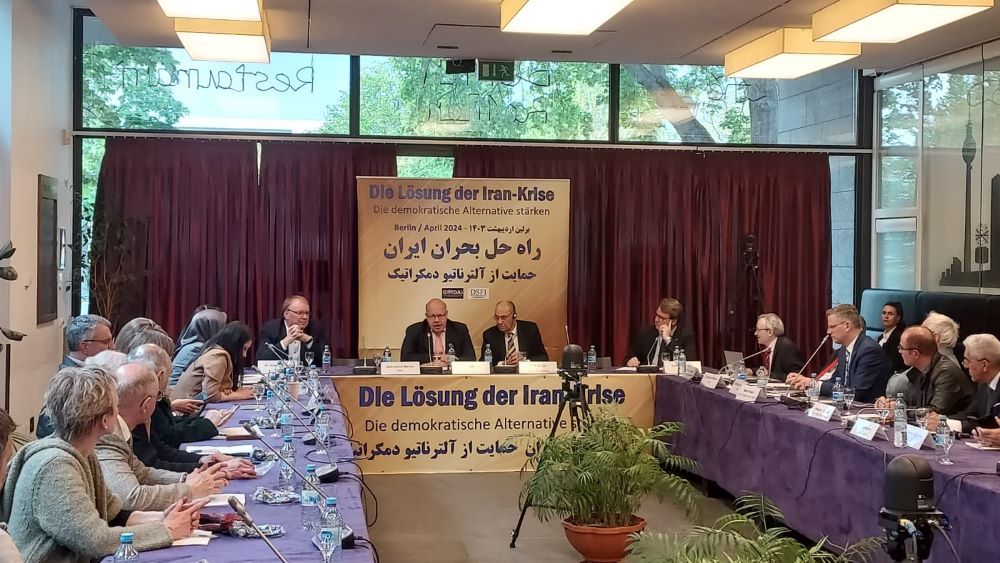
On April 25, 2024, a conference was held in Berlin, Germany, titled “Solving the Iran Crisis: Advocating for Democratic Solutions.” The meeting was moderated by Christian Muller, a representative of the German Federal Parliament, and discussed critical issues such as the Iranian regime’s terrorism, its demonization campaign against the National Council of Resistance Iran (NCRI), human rights violations, and the need to expand support for the Iranian people’s quest for a free, democratic and non-nuclear republic of Iran.
In a video message addressing the conference, Mrs. Maryam Rajavi, the President-elect of the NCRI, commended the bravery and steadfastness of Dr. Vidal-Quadras, portraying the regime’s attempt to assassinate him as emblematic of its true nature.
Amid growing internal dissent and fear of popular uprisings, Mrs. Rajavi contended that the regime had intensified its repressive measures, including a surge in executions and suppression of women in public spaces.
In the context of regional conflicts, Mrs. Rajavi pointed to the regime’s direct involvement in warfare, particularly citing recent events on April 13 as evidence of its aggressive stance. She asserted that Supreme Leader Khamenei benefits from the turmoil and suffering caused by the regime’s actions, positioning Tehran as the primary instigator of conflict and terrorism in the region.
In her address, the NCRI President-elect strongly criticized the policy of appeasement towards the Iranian regime, particularly regarding its two key elements: turning a blind eye to the regime’s oppression of its own people and its acts of terrorism and warmongering abroad, and actively siding with the regime to thwart any prospects of democratic change in Iran.
She emphasized that the time for regime change is now more ripe than ever, asserting the capability of the Iranian Resistance and the Iranian people to bring about such change.
Mrs. Rajavi urged members of the Bundestag to take decisive action by promoting initiatives to:
– Officially designate the IRGC as a terrorist entity.
– Declare the Iranian regime as a threat to world peace and security under Chapter VII of the United Nations Charter.
– Activate the snapback mechanism in UN Security Council Resolution 2231.
– Recognize the Iranian people’s legitimate struggle to overthrow the mullahs’ regime.
MP Carsten Müller condemned the Iranian regime’s attacks on Israel and the alarming rate of executions within Iran, which often go unnoticed by the international community. He called for decisive action, including labeling the Revolutionary Guards as a terrorist organization, to hold the regime accountable for its atrocities. Müller asserted solidarity with the Iranian people’s aspirations for freedom and emphasized the importance of supporting the opposition’s efforts to bring about meaningful change from within.
Professor Alejo Vidal-Quadras delivered a compelling speech advocating for a significant shift in Western policy towards Iran. He highlighted the ineffectiveness of the policy of appeasement towards the Iranian regime and stressed the urgent need for regime change in Iran. Vidal-Quadras praised the Iranian opposition, particularly the NCRI and the People’s Mojahedin Organization of Iran (PMOI), as crucial agents for democratic transformation in Iran. He underscored the potential for a democratic Iran to positively impact global geopolitics and emphasized the importance of active engagement in advocating for change.
Former German Minister of Economy and senior advisor to German Chancellor Angela Merkel, Peter Altmaier, expressed his support for the Iranian community in Germany and their struggle for freedom in Iran. He acknowledged the enthusiasm and commitment of Iranians in Europe and praised Mrs. Rajavi’s Ten-Point Plan as a document aligned with universal principles of democracy and human dignity. Altmaier highlighted the need for broader public awareness of the human rights abuses perpetrated by the Iranian regime and suggested strategies for achieving this, including leveraging social media and engaging with NGOs and academic institutions.
German MP Michael Meister reflected on his two-decade involvement with the Iranian resistance, underscoring the need for determination and perseverance in fighting the Iranian regime. He recalled his initial encounter with Mrs. Rajavi in Berlin and recognized the significant progress made in advancing the resistance against the Iranian regime. Meister stressed the dual threat posed by the regime’s internal repression and external aggression, expressing alarm at the staggering number of executions in Iran. He echoed previous calls for designating the Revolutionary Guards as a terrorist organization and emphasized the importance of economic pressure in exerting leverage and compelling political change in Iran.
MP Christoph de Vries stressed that peace in the Middle East remains elusive as long as the current regime in Iran persists, citing recent attacks on Israel as evidence of the regime’s destabilizing actions beyond its borders. He emphasized the imperative of preventing the regime from acquiring nuclear weapons and affirmed his party’s commitment to taking concrete action, including listing the IRGC as a terrorist organization across Europe and imposing restrictions on trade with Iran. De Vries also addressed the issue of the Islamic Center in Hamburg, urging its closure due to its links to the Iranian regime and its involvement in supporting terrorist activities.
Martin Patzelt, a former member of the German Bundestag, expressed his commitment to supporting the cause of freedom and human rights in Iran during the gathering. He emphasized the need to discern truth from misinformation perpetuated by the Iranian regime and affirmed his belief in the NCRI as a viable alternative for a free Iran. Patzelt acknowledged the challenges posed by the Iranian regime’s repression and economic hardships and emphasized the importance of collective action involving political leaders, civil society, and religious institutions in advancing the cause of human rights and democracy.